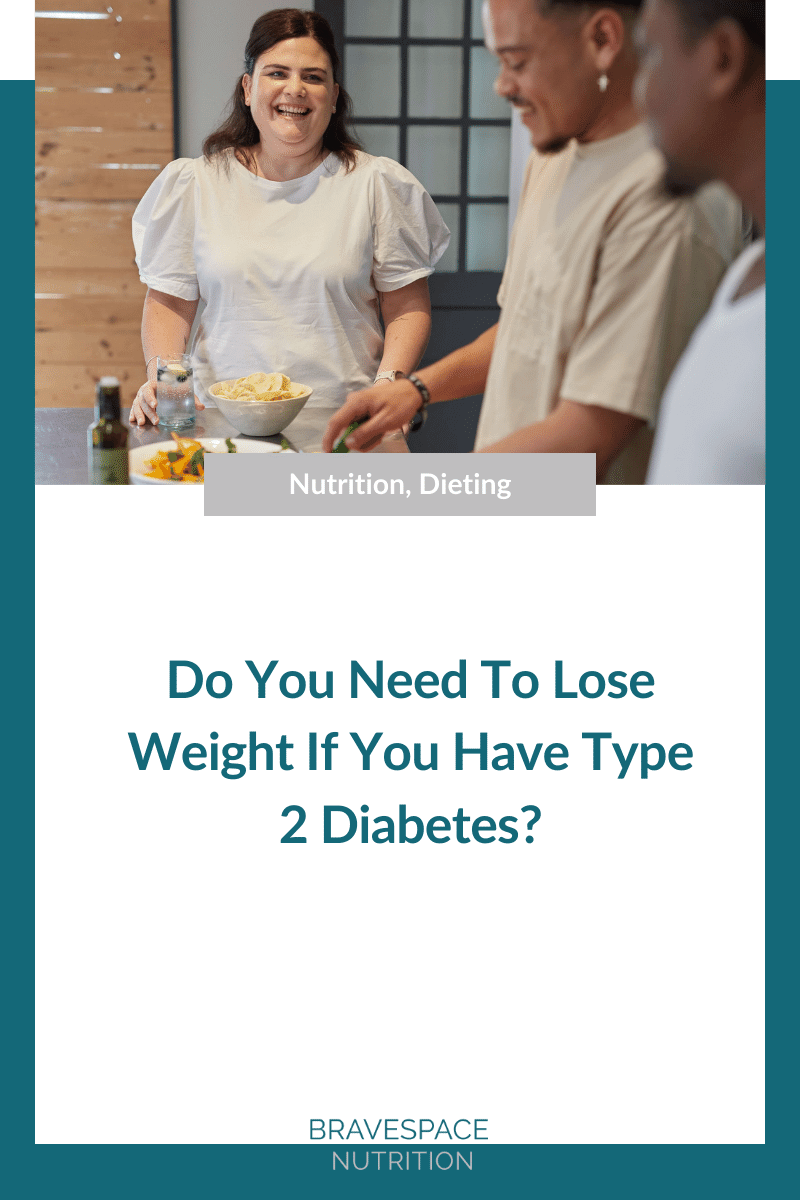Do You Need To Lose Weight If You Have Type 2 Diabetes?
As registered dietitians, we know how hard it can be to disseminate all of the information that is out there about diabetes and body size.
The pressure can be tremendous to lose weight, often coming from the advice of doctors and other health clinicians. But seeing that weigh loss is unsustainable in the long-term, it begs the question: do you need to lose weight if you have diabetes? And if not, what’s the alternative?
What is type 2 diabetes?
Normally, when you eat food and digest it, a molecule called “glucose” is released into the blood causing your blood sugar to rise (this is a normal part of digestion). Too much glucose or too little glucose can be bad, so your body has developed a way to naturally regulate blood glucose levels within a certain range. A hormone called insulin acts as a key to allow cells to use glucose and lower blood glucose levels.
Type 2 diabetes, also known as noninsulin-dependent diabetes, is a condition in which the body loses its ability to regulate blood sugar levels, ie glucose hangs out in your blood for longer than it should. There are currently 11 different places where the malfunction can happen on your cell that can cause you to have difficulty getting glucose into your cells. Type 2 diabetes requires medication to make sure that you can consistently and thoroughly take the glucose in your bloodstream and get it into your cells.
How does diabetes develop?
Diabetes develops due to a variety of factors including genetics, age, presence of other health conditions, chronic stress, and allostatic load due to things like racism and discrimination. For those with type 2 diabetes, insulin-resistance is causing glucose to stay in your blood for too long. There can be many things that cause this to happen.
Some risk factors for developing type 2 diabetes include:
Age
Genetics
Family history
Ggestational diabetes
Polycystic ovarian syndrome (PCOS)
While doctors attribute type 2 diabetes to body size, weight is not the sole determinant factor of whether one develops type 2 diabetes or not and it’s important to note that correlation doesn’t equal causation.
Why do doctors recommend weight loss for diabetes?
Weight loss is often prescribed as a one-size-fits-all solution to a plethora of health issues because weight stigma is baked into the education that doctors receive. Doctors prescribe weight loss to help with diabetes because the assumption is that weight loss will improve labs. And while this can temporarily be true re: lab improvements and reduction in HA1C and fasting blood glucose , it’s important to take into consideration long term impacts.
Dietiting is not sustainable for most people in the long term and leads to things like binge eating, weight GAIN (yes dieting is the best way to gain, not lose, weight long term), and lack of interest in exercise. This is due to the intense nature of most diets and the rebound effect that happens when inevitably people stop dieting.
Research also shows that weight loss isn’t the magical-fix doctors originally once thought, and weight is more complicated than just eating well and exercising. Weight also is not an accurate measure of health and there are health promoting behaviors that can improve health that have nothing to do with weight loss.
True health-promoting behaviors are a much better predictor of future health than body size is—and those behaviors aren’t just about food and exercise! Adequate sleep, strong social connections, and reduced stress have been shown to have a major impact on well-being, along with social determinants of health including the experience of oppression.
What are doctors not telling you when it comes to weight loss and diabetes?
1. Restriction and dieting can lead to binge eating, which worsens blood glucose fluctuations.
Studies suggest that binge eating may be the most common eating disorder in people with T2DM including 12% of people with T2DM also suffering from BED (1).Doctors and healthcare practitioners recommend weight loss quite often as a panacea to all health concerns. When people are told to lose weight, they often begin restricting food and exercising. They restrict food, including the types of foods they eat, the variety of food, how often they eat, etc.
Sometimes this may be in the form of a fad diet, like Noom or Weight Watchers, and other times, it’s a less formalized diet and may be a “lifestyle plan”. But more often than not, these ways of eating are not sustainable in the long term. Your body can’t survive off such restrictive diets, and it’s not meant to. When you restrict food or diet, your body notices and it fights back. You begin to think about food more often, experience intense cravings, and you may just feel a lot hungrier than normal. This can lead you to binge eat or eating more than you normally would.
Restricting food leads to binge eating, which leads to shame, which leads to more restriction. It’s an endless cycle that leaves you feeling like crap and leaves your health in worse shape than before. Those who experience yo-yo dieting actually have larger fluctuations in blood sugar levels than those who do not. Food restriction (aka dieting) puts you at risk for hypoglycemia (low blood sugar) and binge eating puts you at risk for hyperglycemia (high blood sugar). Both ends of the spectrum can be harmful to your health when you have diabetes.
2. Weight loss attempts often lead to weight cycling, which can worsen blood glucose fluctuations.
Most individuals fail to maintain weight loss due because the body fights hard to keep itself within a weight range that it feels comfortable and safe. As a result, weight cycling happens. This is a process characterized by weight fluctuations (both up and down) and is sometimes also called “yoyo dieting”. You lose weight through restrictive eating and excessive exercise, but the dieting and exercise patterns aren’t sustainable. After a period of weight loss, many people gain the weight back and then some. And this weight gain and loss is very hard on the body and causes spikes in glucose levels, which is not supportive for management of type 2 diabetes. Additionally, periods of rapid weight loss are associated with increased hunger, increased need for more calories long-term and overall slower metabolism even after gaining the weight back.
3. You don’t need to lose weight to manage your blood sugars and be healthy.
As dietitians at Bravespace Nutrition in Seattle, WA, we support people in lowering their glucose levels and getting their diabetes under control without feeling like they have to lose weight. You can change elements of your diet over time, learn about what impacts your glucose levels, continue to eat carbs and still maintain healthy levels. You don’t need to lose weight to control your blood glucose. In fact, long term we believe that restrictive diets will do more harm than good to diabetes management.
4. The goal of diabetes management is to regulate blood sugar levels and reduce the frequency of large spikes or dips in blood sugar.
The best way to manage blood sugar levels is to eat consistently, which means eating often, eating enough and balancing out macronutrient groups. If you’re looking to improve your nutrition habits to help manage your diabetes, it’s crucial that you reach out to dietitian nutritionist to help you do this.
You’ll also love…
Do you have diabetes and want support on managing glucose levels? Did your doctor recently tell you to loose weight to “manage diabetes”?
Knowing how to handle your health can be overwhelming, confusing, and exhausting, but you don’t have to do it alone. Our dietitians at Bravespace Nutrition use anti-diet medical nutrition therapy to help individuals manage their diabetes while avoiding the toxicity of diet culture. Just because have type 2 diabetes does not mean that you have to lose weight! To get started on your diabetes management journey, schedule a free 15-minute discovery phone call today!




